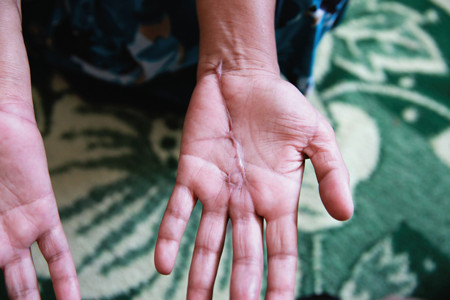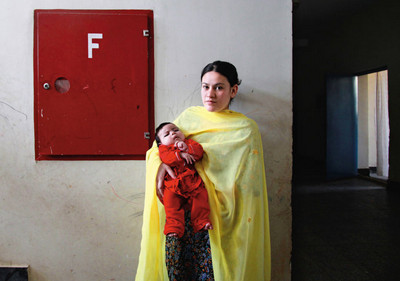By Rena Silverman
In 2010, photographer Gabriela Maj was working on a project about an artist in Afghanistan when one of her editors suggested she take a look at Afghan women's prisons. Maj recalls: "He said, you know there are all these stories kind of floating, kind of bubbling up in the international media about women being incarcerated for something known as 'moral crimes.' And they're being put into these prisons with their kids.'"
Her editor was right. When she arrived at Badam Bagh, a women's prison in Kabul, her first thought was, "It sounds more like a kindergarten or elementary school during recess than it does a prison facility."

A knife attack by this woman's husband left the scar on her palm. He had accused her of interacting with men who weren't from her immediate family at their wedding. She is incarcerated at Herat Women's Prison for moral crimes. (Photo: Gabriela Maj/The Almond Garden)
That's because many of the inmates are mothers who either gave birth in the facility or brought their children to live with them after they were incarcerated.
Maj has photographed over 100 incarcerated women in eight different prisons and is now presenting her portraits in the book Almond Garden.
As she worked on the project, she learned that "moral crimes" include premarital sex (a charge applied even to victims of rape) and adultery. Sentences can run up to 15 years. According to Human Rights Watch, there has been an increase of such incarcerations: "The number of women and girls imprisoned for 'moral crimes' in Afghanistan has increased by 50 percent in the period from October 2011 to May 2013." Statistics from Afghanistan's Interior Ministry indicating that the number rose from some 400 in the fall of 2011 to some 600 in the spring of 2013.
The women made many requests to Maj regarding how they would be shown in the book. "Some of [the women] wanted to share their story and had no problem with having their portraits taken," Maj explained in an email. "Some only wanted to share their story, did not want to be photographed at all, and some wanted to share their story and wanted to be photographed but with their face covered to retain anonymity."
To protect all the women, she decided not to use their names in the book nor to give the locations of the prisons where they were incarcerated.
"I did not want to confuse the reader [by using some real names and some aliases] and my priority was to protect the identities of those who wanted to remain anonymous," she notes.

NPR, Sep. 6, 2015: According to Human Rights Watch, there has been an increase of such incarcerations: "The number of women and girls imprisoned for 'moral crimes' in Afghanistan has increased by 50 percent in the period from October 2011 to May 2013."
But she will share the stories she heard. She met one women who'd been raped and become pregnant as a result. Her community organized a jirga, or an assembly of men who make decisions based on the teachings of Islam, which sentenced her to be stoned to death for the alleged "moral crime" of having sex out of wedlock.
In a rare move, her father stepped in and wrote a letter to local authorities asking instead for her arrest. As a result, she was arrested and sent to prison. But she told Maj that her family and the alleged rapist's family tried to arrange a marriage between them to confer legitimacy on the child. But her assailant did not agree to marry her. "As she told me this story," says Maj, "her infant son played on the carpet between us."
Maj also met women convicted of murder, including a woman accused of killing some 27 men. Asked to comment on these cases, Maj said she does not wish to categorize the women as innocent or guilty: "The extraordinary disempowerment of these young women oftentimes resulted in situations in which they were unable to bear the burdens that had been put upon their shoulders," she says. "And I decided at a certain point in this project that I was going to abandon this category of guilty or innocent."
Instead, she has turned her focus to advocacy. A part of the proceeds for her book go to Women for Afghan Women, a charity group which runs several women's shelters in Afghanistan.
Maj's hope is that Almond Garden can contribute to a change in legislation by supporting the ratification of the Elimination of Violence Against Women (EVAW), a law formulated in Afghanistan in 2009 that would criminalize rape, forced marriage, domestic violence and more. But parliament never ratified the law.
In the meantime, her mission has evolved from reportage to a human rights campaign.
"I knew that as a woman, albeit a foreign one, I was in a position to collect the stories of these individual women and create a record of their experiences and of the human rights violations that affected their lives," she says. "The motivation behind continuing this project came from the women themselves, who were in most cases so eager to share their stories, and from the hope that this document would act as an advocacy tool on their behalf."



